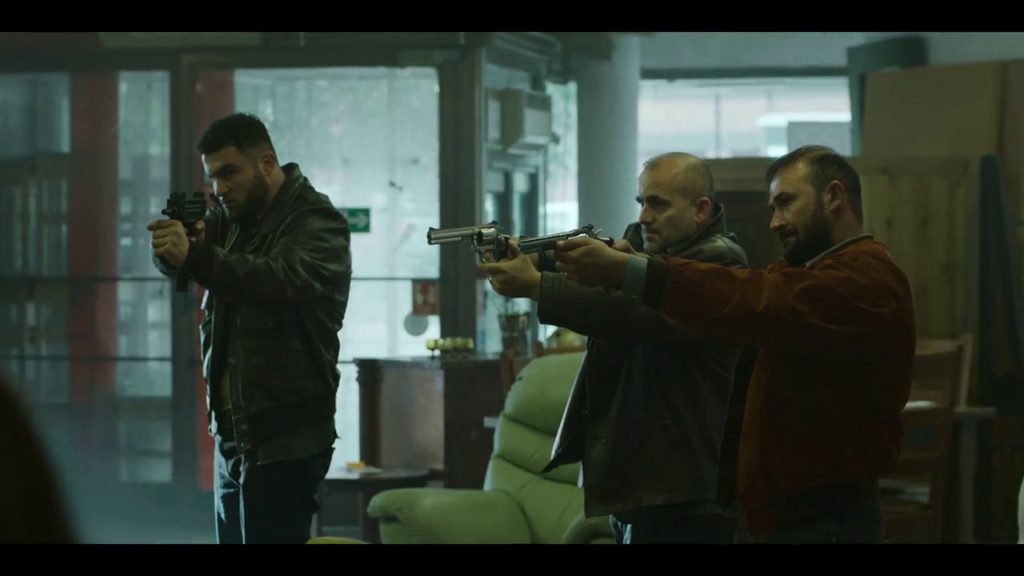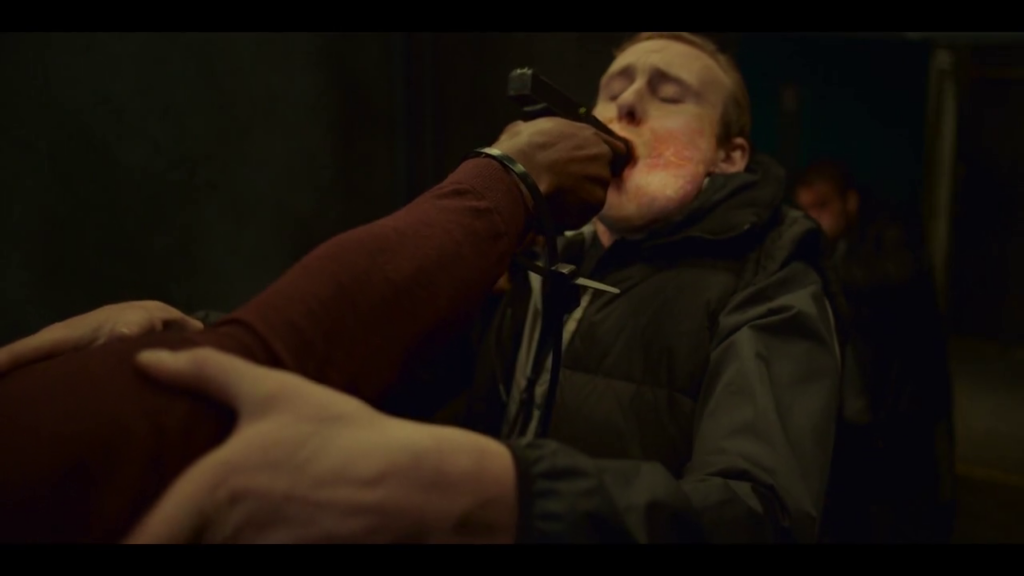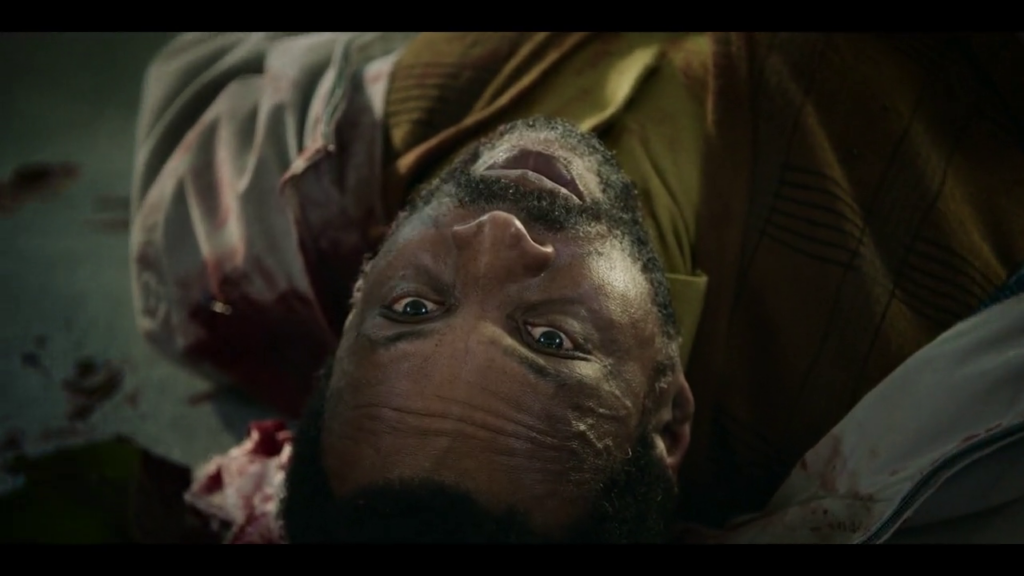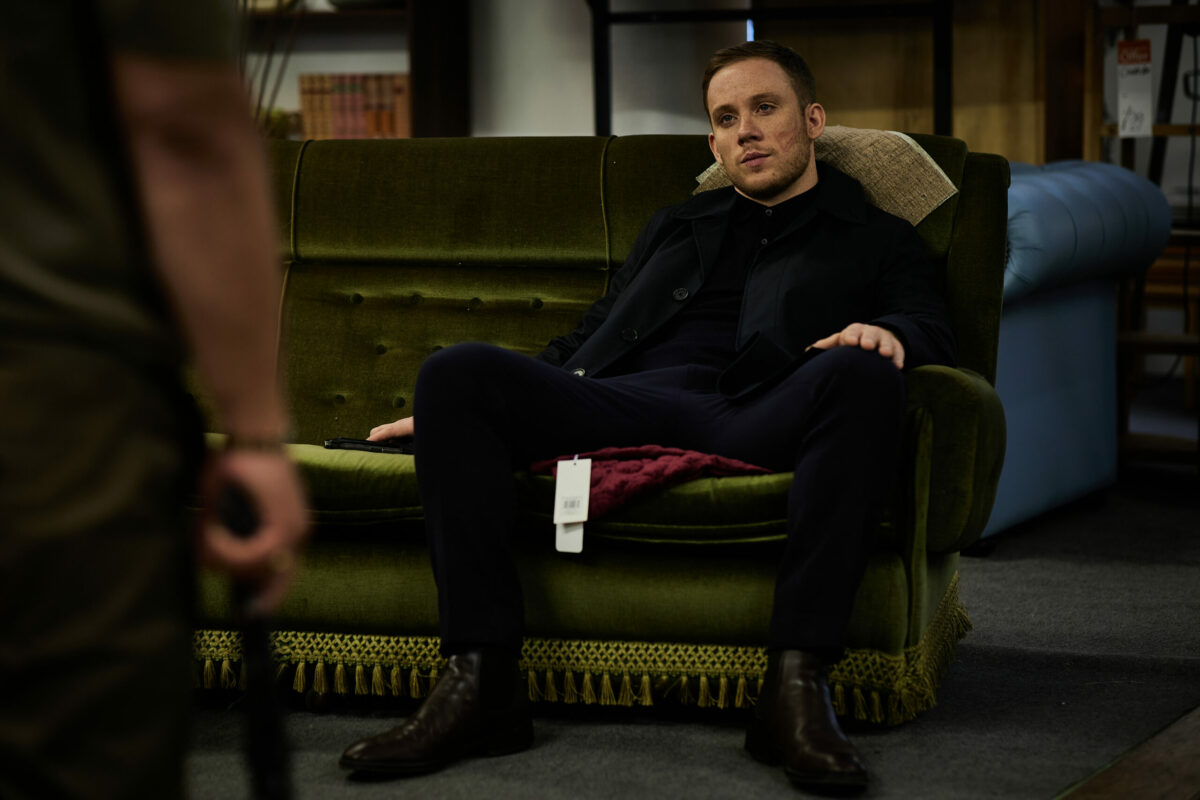Gangs of London
Season 2
Episode 5
The departure lounge (in more than one sense)
Who are “The Investors”?
It’s a question worth taking a step back and examining for a moment. Over the course of Gangs of London, that proper noun takes on a kind of totemic significance. Irrespective of which character is speaking, irrespective of that character’s relationship to the Investors, they’re always referred to as “The Investors.” It seems to be a universally agreed-upon designation, similar to “The King” or “The Pope.”
And it’s always pluralised. Nobody ever mentions “an Investor.” By this point in the show, it would feel weird if they did. The Investors are not to be understood as a group of individuals with overlapping interests. They’re presented more like a malevolent hive-mind; sinister and omniscient as it directs events from the shadows. No human person identified as one of the Investors is ever shown on camera, not even in silhouette; we never hear their voices first-hand, not even through a filter. They’re certainly never named.
They exist in the show as a pervasive, ominous suggestion – as one character telling another, “You’d better not do that. The Investors wouldn’t like it if you did that.” Their will is exclusively effected by proxies, like Koba and Asif and Ms. Kane. In this, they remind me of villains like “The Entity” in Mission: Impossible – Dead Reckoning, or “The Patriots” in the Metal Gear Solid games.
To be clear: I think this is the right way to characterise the Investors, and it’s a characterisation that the show holds to with impressive consistency. It feels appropriate to the wider themes of the series; of families and cultural communities being torn apart by the Darwinian incentives of global capitalism. The Investors shouldn’t be megalomaniacal supervillains, but the avatar of an economic system. This is something Gangs of London gets right.

The trade-off, however, is that when so much of the show’s action is motivated by the agency of people we never see, the motives of the people we do see can start to grow… fuzzy. The relationships between characters, the dynamics between them, exist in a state of frequent upheaval; the slate is wiped clean and boundaries redrawn on an episode-to-episode basis. Very little about the drama, here in Season 2, feels ontologically permanent.
Take Koba, for example. After his devastating loss to Sean and Lale in the previous episode, he’s thoroughly dressed down by Asif for his failure to anticipate the attack. He’s issued a blunt ultimatum: if he doesn’t get his house in order and kill Sean soon, his neck will be the next on the Investors’ chopping block
In a story more concerned with character interiority than this one, Koba might have reflected that he’s now on the receiving end of the same threat that he issued to Luan an episode ago. But if S2 E5 scriptwriter Rowan Athale recognises any dramatic irony in this scenario, he does nothing with it; the emphasis is all on the shift in power dynamics. Specifically, Koba starts to second-guess his allegiances. With Saba acting as his go-between, he organises a face-to-face parley with Sean, where the pair of them coyly bat around the possibility of a partnership.
I understand the logic of it; all the opportunistic realpolitik. But is this really how Koba is best served as a character? His introduction in the first scene of this season positioned him – effectively and memorably – as a nemesis for the protagonists, and as a direct conduit for the Investors’ agency in the story. For him to be reframed – after just four episodes and a single setback – as a potential ally to Sean just feels like a waste of a good arch-villain. Once again, it’s a plot complication; but to what end? It muddies the waters; makes the genre elements at play less compelling.
Once again, it’s a plot complication; but to what end? It muddies the waters; makes the genre elements at play less compelling.

S2 E5 is the first of two episodes to be directed by Nima Nourizadeh, a British-Iranian filmmaker whose main qualification for the job was American Ultra, an unremarkable Jesse Eisenberg/Kristen Stewart action comedy from 2015. As I make my way through Season 2, I find that parsing the episodes according to their director isn’t as useful an exercise as it was in Season 1. It wasn’t conceived as a director-led show, the way that the first season was, and Nourizadeh works to the same house style that by now is well-established.
Style isn’t something Gangs of London struggles with, even when it’s negotiating its dumbest choices. It has a consistent visual and sonic identity, inherited from Gareth Evans and Matt Flannery’s movies: high-contrast, desaturated cinematography; lithe, sinuous camera movement; propulsive scene-to-scene editing, with the tension kept at a steady simmer by the ominous, droning score. (Composers Aria Prayogi and Fajar Yuskemal are among the staff carried over from Season 1, and their moody, textured compositions do a lot to make the show tick).
I’ll give this to Nourizadeh, though: he absolutely nails this episode’s big set-piece, Elliot’s infiltration of Koba’s compound. Elliot is so close to getting out of the game completely: Singer has made good on their arrangement, with a flight to Jamaica for him and his Dad organised in exchange for the flash drive. Father and son are packed and on their way to the airport, when Elliot gets a frantic phone-call from Shannon, asking for his help to rescue Ed from Koba’s torture chambers. Unable to leave Shannon alone in her hour of need, he leaves his dad in the airport terminal with the flash drive, telling him to look out for Singer. He races against time to extract Ed and get back before the plane departs without him.
The ticking-clock element gives the sequence a boost of tension from the outset, and it’s ratcheted up once Elliot creeps inside the warehouse stronghold. He finds Ed chained to a chair, adjacent to a room with three armed guards taking their lunch break. There’s a savage fight with a henchman that’s complicated by the need to muffle his cries for help while also wrestling for control of a knife (Tim Connolly’s choreography, scrappier and closer than Jude Poyer’s, is well utilised here).

After freeing Ed from his handcuffs – by the harrowing means of smashing his hand with a lead pipe – they successfully escape, though not before almost getting caught by the three guards. The sequence reaches a rousing climax when Elliot is held at gunpoint, and for a moment, it looks like mission failed as he moves to zip-tie himself. But then, in a single motion, he disarms his nearest assailant and neatly headshots the two others… with the gun barrel lodged in the mouth of the first. The moment plays out in super-slow-motion, the poor bastard’s disintegrating cheeks glowing orange from the light of the muzzle flashes inside them. It’s a moment of hysterically baroque violence, and one of my favourite action punchlines in the whole show; gory and cathartic and ridiculous in exactly the right proportions.
The moment plays out in super-slow-motion, the poor bastard’s disintegrating cheeks glowing orange from the light of the muzzle flashes inside them.
It’s also the last part of S2 E5 that made me happy.
Elliot rushes back to the airport after leaving Ed with Shannon. Meanwhile, a red-haired woman carrying a baby sits opposite Singer and Elliot’s dad in the terminal, giving them a suspiciously friendly smile. Elliot checks in for his flight, hurries to the departure lounge… and hears a scream from the direction he’s heading. EMTs jostle him as they run past. He arrives at the source of the commotion and sees two bodies motionless on the floor. Singer’s blood pools about him. He meets his father’s lifeless eyes.
I’m trying to think of the word for the emotion this moment elicited in me. What was it? It’s on the tip of my tongue…
Oh yeah: hate. That was it. I hate this development.

In an interview with Metro from October 2022, Corin Hardy expressed the ambition to make Gangs of London “the most dangerous show on television.”
He elaborated: “What I mean by that is it’s exciting when you’re watching something and you don’t know what the rules are, and you don’t know how far it is gonna go. I think you can get too comfortable watching TV and just knowing week by week who’s going to do what and who’s going to say what. I never want Gangs of London to feel like that, so that’s what I mean. It should feel dangerous, and it should feel dangerous for the characters, and in turn thrilling.”
You can see this mandate at work earlier in the season, with the deaths of Alex and Floriana. Those were played for shock value, certainly, but it still felt like the drama could accommodate them. They generated interesting conflict, more than they detracted from it.
This, though? It decimates my will to keep watching the surviving characters. It doesn’t feel “dangerous.” It feels careless. It feels cheap. It feels indifferent to the reasons that a viewer would be compelled to engage with the series as entertainment.
It decimates my will to keep watching the surviving characters. It doesn’t feel “dangerous.” It feels careless. It feels cheap.
Elliot’s father was the only truly blameless figure in Gangs of London’s cast. He knew nothing about what Elliot was involved in, and at no point had any agency over his own fate. His function in the story was as Elliot’s tether to his humanity (an impression that’s reinforced by the flashback that opens this episode, to the funeral of his wife and son 6 years earlier). In his absence, Elliot is hollowed out of anything but pain, anger, and vengeance. His very first action after leaving the airport is to confront Ms. Kane in her home. She tries to plead for her life, denies her involvement, denies that she had any choice in the matter if she was involved, but her words fall on deaf ears. Elliot kills her without a glimmer of remorse in his eyes.

The real kicker is that she was telling the truth: Elliot’s assumption that the Investors were behind the hit, while reasonable, is mistaken. In the episode’s final scene, we find Sean and Koba meeting in a multi-storey car park, surrounded by lackeys and looking quite comfortable together. The red-haired woman we saw at the airport pulls up next to them and delivers the flash drive full of compromising information on the Investors. (I have no idea who this character is, by the way. She’s credited as “Leanne” on IMDb, and played by Nicola Millbank, but S2 E5 is the first and last time we ever see her. I’ve no clue how she’s connected to Sean, or, indeed, how she was able to assassinate two people in broad daylight, retrieve a package from their bodies, and escape unmolested from a part of a busy airport that’s explicitly inside the security checkpoint. It’s a nonsensical plot beat, quite apart from anything else.)
More to the point: yes, Sean is the one who orchestrated the deaths of Singer and Elliot’s dad. I know this isn’t materially, objectively more heinous than actions Sean’s taken in the past; this is, after all, a show whose very first scene saw him burning a person alive.
But it’s a question of narrative framing. He ordered the death of a character who was well-established as a guileless innocent, purely for a cynical, strategic advantage. He’s calmly pleased upon hearing Leanne’s report, which he receives, again, in a multi-storey car park, surrounded by black sedans and armed bodyguards, while conferring with Koba. Even within the moral rubric of the Gangs of London universe, this is the kind of callous indifference towards committing murder we associate with an out-and-out villain. Any distinction between him and the Investors is now moot. It’s impossible to imagine Sean ever being presented sympathetically after this without the show coming across as utterly disingenuous.
Gangs of London is a dark show about morally compromised people, but this is the first time I’ve felt it’s skated over the line into outright nihilism.
Once again, Season 2 has wiped the slate and redrawn the boundaries; for the final three episodes, the conflict has been reoriented away from the rebellion against the Investors, and towards a showdown between Elliot and Sean. All I can do is throw my hands up. What outcome am I supposed to be anticipating, here? What is my stake in this battle? What meaning am I supposed to derive from this contest of wills between two mass murderers? Gangs of London is a dark show about morally compromised people, but this is the first time I’ve felt it’s skated over the line into outright nihilism. It’s the sort of thing that the TVTropes page “Too Bleak, Stopped Caring” was built for.
Season 2 still works as a delivery mechanism for its sequences of action and tension; for the minute-to-minute construction of its thrills and its set-pieces. That’s something to cling to. At this point, there’s precious little else.
- Review Series: Gareth Evans
Is It Good?
Not Very Good (3/8)
More Gangs of London reviews
Andrew is a 2012 graduate of the University of Dundee, with an MA in English and Politics. He spent a lot of time at Uni watching decadently nerdy movies with his pals, and decided that would be his identity moving forward. He awards an extra point on The Goods ranking scale to any film featuring robots or martial arts. He also dabbles in writing fiction, which is assuredly lousy with robots and martial arts.


2 replies on “Gangs of London, Season 2, Episode 5”
Nima Nourizadeh also directed that absolutely bananas teen comedy Project X. He made that and American Ultra and then disappeared ten years ago, only showing up to occasionally direct-for-hire English prestige genre shows like this. Project X is weird enough that I’m left wondering what other ideas he has that we might have seen if either of his divisive movies had made money.
I never saw Project X, but I understand that the house party in it is meant to be properly apocalyptic.
There are some pretty extravagant tracking shots in American Ultra, as well, much more ambitiously mounted than you’d think the premise would warrant. Nourizadeh is obviously enthusiastic about his shot setups, if nothing else.